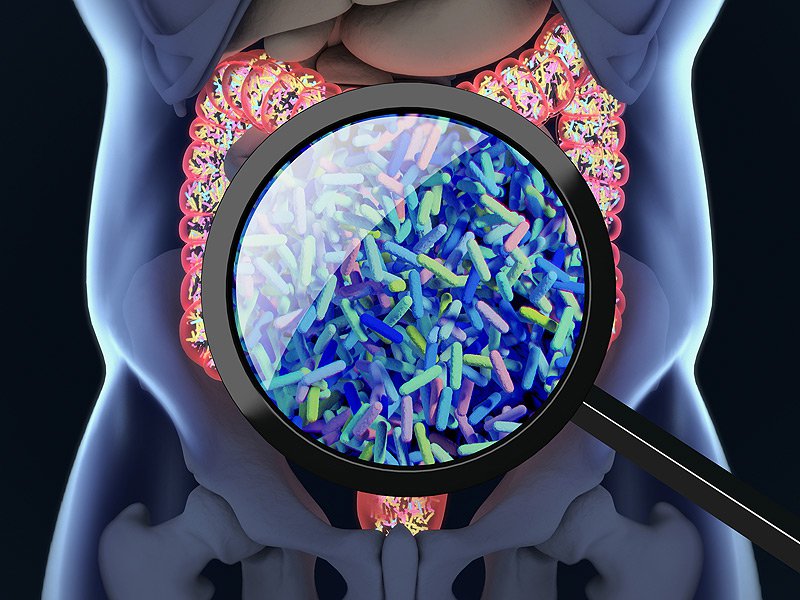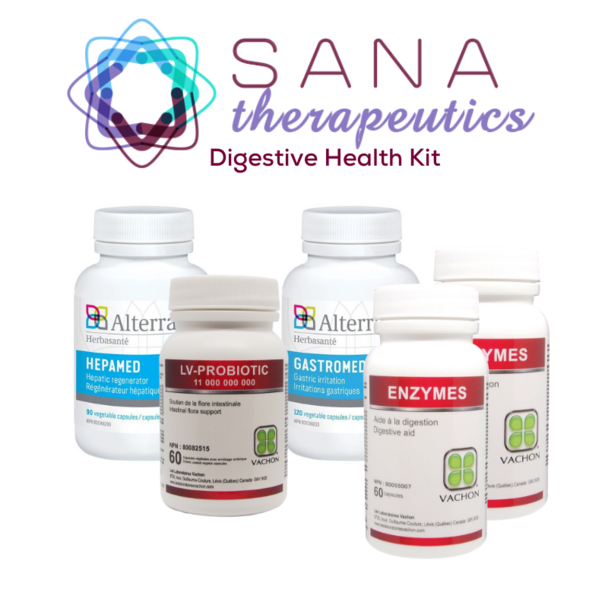
Did you know that in your body, there are nearly as many bacterial cells as human cells? Most of these microbiota reside in your gut—and as it turns out, they are doing you a very big favor.
First of all, don’t worry—your gut isn’t as bloated with bacteria as the above sentence makes it sound. Intestinal bacteria are far, far smaller than the average human cell, so it’s estimated they only constitute about 1-3% of your body mass. But despite being so small, they do a massive amount of work on your behalf. A healthy population of gut bacteria performs many important functions necessary for digestion. Without them, you would be unable to break down food properly or absorb certain nutrients from the food you eat.
And that is exactly what happens in some types of autoimmune disease. If you have irritable bowel disease or another gut-related autoimmune disorder, you are probably already aware that your gut may not be functioning correctly. But addressing intestinal health is a very important factor in managing autoimmune disease, regardless of what type of autoimmune illness you have.
Your Guts: Grand Central Station of the Immune System
Science is just beginning to delve into the wonderful world of gut bacteria, and in the process discovering many clues that can help us better understand autoimmune illness. For example, certain species of gut bacteria can translocate to other organs, where they may trigger an autoimmune response in the body.
This is why maintaining a healthy intestinal lining is so important to managing autoimmune diease. When it is functioning well, the intestinal lining helps to keep gut bacteria where they belong – in your intestine. Unfortunately, “leaky gut” has been linked to autoimmune conditions, making it even more critical to pay attention to your intestinal health.
Managing Gut Health
So what can you do? Is “leaky gut” out of your control? As it turns out, there are plenty of things you can do to help keep your intestines healthy:
- Manage your stress. High stress levels have been found to alter the gene expression of gut bacteria, making them reproduce faster and spread outside the gut.
- Exercise regularly. A 2014 study found that those who work out have more varied gut bacteria than those who don’t.
- Get enough sleep. Lack of sleep has been linked to unhealthy gut flora, which increases the risk of inflammatory response.
- Eat well. Diets high in prebiotic fiber make your gut a more welcome home for beneficial microbes and help keep bacterial populations in check.
Does all this sound familiar to you? These tips make up the first four parts of the Hache Protocol for Pain Resolution™. Since the elements of the Protocol all work together to minimize chronic pain, it’s no wonder they are all connected to such an important area of health as the gut.
Let’s start by exploring nutrition.
Managing autoimmune disease with nutrition is of course an immense topic. We could write a whole series of books on it and still only just scratch the surface of what there is to know and discover. But you have to start somewhere. A great question to start with for anyone experiencing autoimmune symptoms is:
What should you eat (or not eat) to keep your gut healthy?
Get to Know Your Gut: Using the Elimination Diet to Manage Autoimmune Disease
If you’re suffering from poor gut health and don’t know what’s causing it, try a 7 day elimination diet. When your gut is overrun with bad bacteria, those bacteria tell your brain to eat certain things. This is where junk food cravings come from. Unfortunately for us, succumbing to those cravings will make our health even worse. Some of the most common culprits are:
- Dairy
- Raw Fruits and Veggies
- Gluten
- Lectins
- Sugar
Starting with the food you eat the most, try eliminating them one at a time from your diet for just seven days. If you don’t feel a change, reintroduce the food again. It may be a good idea to wait a couple days before moving on to the next food so you can observe the effects of reintroducing each food. Chances are, you’ll identify some foods that you should stay away from.
Avoiding foods that you’re sensitive to will do wonders for getting your gut health back on track. But if your digestive system is extremely out of whack, you may need additional help to feel your best.
Give Your Guts a Healthy Boost

Supplements are a great way to keep your digestive system working properly. For your convenience, we’ve put together a digestive health kit to support your entire digestive system, including your liver, gallbladder, and stomach. (This is important because all the organs work together, and it’s something most supplements don’t address.)
Most illness (if not all) starts in the gut. Our kit is designed to boost digestive organ function while providing the probiotics and enzymes your body needs for optimal digestive health. Designed especially to be easy for people with autoimmune disorders and similar conditions that compromise gut health, these supplements work together to gently but effectively nudge your gut back into a balanced state. Try out the digestive health kit at the Sana Shop and see if it doesn’t give your gut (and your overall health) a boost.
Sources:
https://www.medicalnewstoday.com/articles/325193.php
https://www.medicalnewstoday.com/articles/325293.php
https://www.sciencedaily.com/releases/2018/03/180308143102.htm
https://www.sciencealert.com/how-many-bacteria-cells-outnumber-human-cells-microbiome-science]
https://www.sciencedaily.com/releases/2018/03/180308143102.htm





